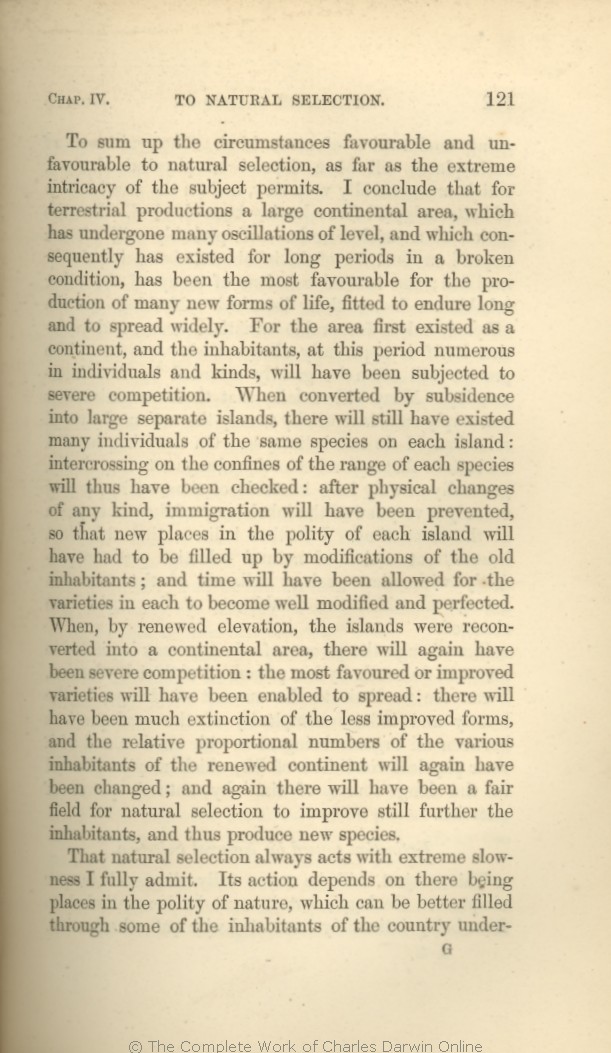To sum
up the circumstances favourable and unfavourable to natural selection, | up the circumstances favourable and unfavourable to natural selection, 1859 1860 1861 1866 |
| up the circumstances favourable and unfavourable for the production of new species through natural selection, 1869 |
| up, 1872 |
| permits. 1859 1860 1861 1866 1869 |
| permits, the circumstances favourable and unfavourable for the production of new species through natural selection. 1872 |
| conclude 1861 1866 1869 1872 | | conclude, 1859 1860 |
| OMIT 1861 1866 1869 1872 |
| looking to the future, 1859 1860 |
| which 1859 1860 1861 1866 1872 | | which, 1869 |
| has 1861 1866 1869 1872 | | will probably 1859 1860 |
| undergone 1861 1866 1869 1872 | | undergo 1859 1860 |
| and which consequently has existed for long periods in a broken condition, has been 1861 1866 |
| and which consequently will exist for long periods in a broken condition, will be 1859 |
| and which consequently will exist for long periods in a broken condition, is 1860 |
| will have been 1869 1872 |
| fitted 1861 1866 1869 1872 | | likely 1859 1860 |
| long 1859 1860 1861 1866 |
| for a long time 1869 1872 |
| For 1859 1860 1861 1866 | | Whilst 1869 1872 |
| first 1860 1861 1866 |
| will first have 1859 |
| OMIT 1869 1872 |
| and 1859 1860 1861 1866 | and 1869 1872 |
| inhabitants, 1859 1860 1861 1866 | | inhabitants 1869 1872 |
| at this period 1859 1860 1861 1866 |
| will have been 1869 1872 |
| will 1859 1860 1861 1866 | | and will 1869 1872 |
| ..... 1866 1869 1872 | | very 1859 1860 1861 |
| have existed 1861 1866 1869 1872 | | exist 1859 1860 |
| island: 1859 1860 1861 1866 1869 | | island; 1872 |
| species will thus have been 1861 1866 |
| species will thus be 1859 1860 |
| new species will have been 1869 1872 |
| checked: 1859 1860 1861 1866 1869 | | checked; 1872 |
| have been 1861 1866 1869 1872 | | be pre- 1859 1860 |
| prevented, 1861 1866 1869 1872 | | vented, 1859 1860 |
| had to 1861 1866 1869 1872 | | to 1859 1860 |
| modifications 1859 1860 1861 1866 1869 | | the modification 1872 |
| have been 1861 1866 1869 1872 | | be 1859 1860 |
| were 1861 1866 1869 1872 | | shall be 1859 1860 |
| reconverted 1861 1866 1869 1872 | | re-converted 1859 1860 |
| have been 1861 1866 1869 |
| be 1859 1860 |
| have been very 1872 |
| have been 1861 1866 1869 1872 | | be 1859 1860 |
| have been 1861 1866 1869 1872 | | be 1859 1860 |
| renewed 1859 1860 1861 1866 | | reunited 1869 1872 |
| have been 1861 1866 1869 1872 | | be 1859 1860 |
| have been 1861 1866 1869 1872 | | be 1859 1860 |
| produce 1859 1860 1861 1866 | | to produce 1869 1872 |
|









